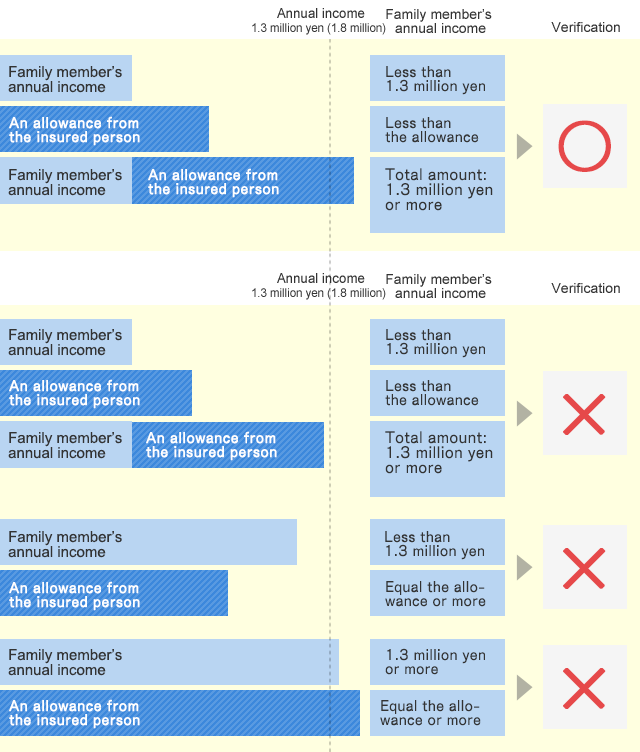(A) Annual income used to verify dependency on the income of the insured person for a living
Annual income used to verify dependency on the income of the insured person for a living includes all income, including salary, business income, and nontaxable income such as income from old age pension and other public pensions and unemployment benefits. In short, this figure is based on gross receipts, not just income for tax purposes.
For this reason, the amount of income for self-employed individuals is generally determined not just from reported (taxable) income from tax returns, but from net sales minus costs. Income reported on tax returns reflects legal deductions for expenses and other items. Expenses such as repairs and depreciation constitute advance or capital investments intended to increase sales in the future and are therefore considered temporary expenses not deducted from income for health insurance purposes.
Procedures with your employer
Your employer may require you to undertake certain procedures in addition to those required by the Health Insurance Society.
(B) Person having a priority dependent obligation
Article 877 of the Civil Code of Japan stipulates that direct lineal ancestors or descendants and siblings are obligated to care for each other. In other words, family members are obligated to care for each other as dependents. For example, the insured person and his or her siblings have equal obligation to care for their parents. Some other examples are listed below:
| Person with priority obligation to care for a married person: | spouse |
| Persons with priority obligation to care for an unmarried child: | parents |
| Persons with priority obligation to care for an unmarried sibling: | parents |
Accordingly, dependent certification requires confirmation of various aspects of the case, including whether others beyond the insured person have the obligation and economic capacity to care for the family member (such as the insured person’s parents or siblings).
Procedures with your employer
Your employer may require you to undertake certain procedures in addition to those required by the Health Insurance Society.
(C) Amount of allowance
If the family member lives apart from the insured person, his or her annual income must be less than 1.3 million yen (1.8 million yen if aged 60 or above, or if eligible for Disability Employees’ Pension) and also less than the amount of assistance (allowance) provided by the insured person.
In addition, this allowance should be an amount generally considered sufficient to provide a living for one adult. The Health Insurance Society has set a minimum allowance amount (annual amount per person). The Society will check to confirm that the amount of the allowance is above this minimum amount.

** Verification is based on annualized income of the family member as of the time of dependent certification. This includes pensions and unemployment benefits. p
(D) Can an application be rejected because the family member is married?
In certain cases, a family member may be deemed ineligible for dependent certification if the Health Insurance Society determines that the total annual income of the family member and his or her spouse is sufficient to provide a living without your support.
The Society specifies basic household living expenses as the cost of living per person for use in making this determination. Verification is based on the formula indicated below. If the total annual income of the family member and his or her spouse is higher than the amount of basic household living expenses for two persons, then he or she may not be certified as a dependent. However, note that this standard is carefully applied to account for actual circumstances.